The ideal option for feeding a child is breast milk. But sometimes a woman, for a number of reasons, cannot feed her baby. In such situations, it is advisable to offer goat milk to children under one year of age, since when using it, allergies are practically eliminated. Parents are often interested in the age at which goat milk products can be given to a baby without harming his health. This milk can be consumed from a very early age if there are no other nutritional options. This product has its pros and cons, which every parent should know about before feeding it to their child.
pros
Many mothers doubt which milk is better for their baby - goat's or cow's. Goat is preferable for infants for a number of reasons.
- Babies, who often have allergies, can more easily digest and process goat milk products due to the reduced amount of casein in their composition.
- It contains many vitamins belonging to different groups.
- Due to the content of a large amount of calcium, which is more easily absorbed by infants, the child’s teeth grow stronger, and sometimes earlier.
- This product contains very small milk balls that are easily digested, which protects the baby from frequent regurgitation.
- Goat's milk, like women's milk, in the baby's stomach takes the form of small lumps similar to cottage cheese, which facilitates its easier absorption.
- One of the main advantages is that it is hypoallergenic. That is why it is recommended for use by children when they often experience dermatitis and allergies.
Minuses
However, this product also has its disadvantages, which you need to pay attention to . Unfortunately, the protein and fat composition of these two types of dairy products is different. Doctors have identified several negative aspects of goat's milk that women's milk does not have.
- Goat product has a fat content much higher than that of mother's milk.
- It does not contain the lipase enzyme, which helps break down fats.
- An increased phosphorus content can place an increased load on the baby’s kidneys.
- Lack of folic acid can cause anemia.
Cons of goat milk
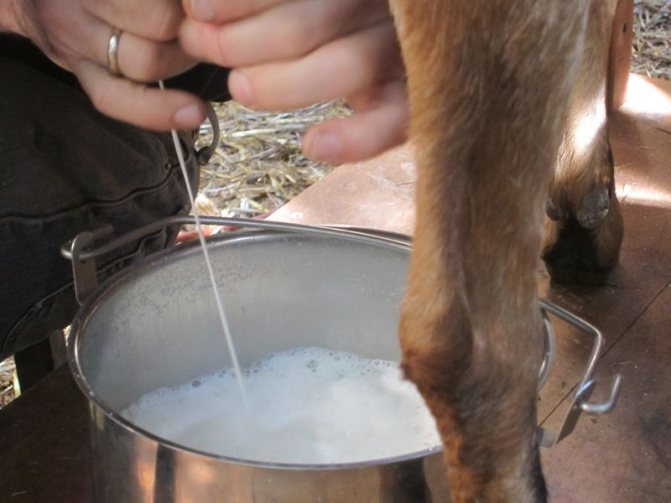
Compared to cow's milk, goat's milk is much healthier and more nutritious, but it is not advisable to consider it as a separate product:
- The composition includes casein protein, which is poorly digested by the baby's body. In the stomach, the protein turns into a dense clot, reminiscent of cottage cheese, which leads to colic and whims for a baby up to a year old.
- The high content of mineral salts puts increased stress on the kidneys, which is not easy for a child to cope with.
- For good hematopoiesis, a baby under one year of age will need iron, and there is practically no iron in goat’s milk, so parents will have to get to know the diagnosis of “anemia” in a child personally.
- Goat milk is also undesirable for newborns as the main food due to its reduced vitamin D content.
- The product is based on a lot of fat, which makes it nutritious and at the same time unsuitable for complete digestion.
- The absence of the lipase enzyme minimizes the breakdown of fats.
There are many supporters of this diet, who have a lot of stories about how a baby’s diet should include this product from the first days. But the final decision is made only by the pediatrician, who, after weighing all the pros and cons for each specific child, will prescribe this product or not.
The benefits of goat's milk have been proven for children under one year of age, when porridge based on it and cottage cheese made from this product are introduced into complementary foods. However, completely switching a one-month-old baby to feeding with unadapted whole goat milk is extremely dangerous!
The famous pediatrician Komarovsky believes that goat's milk should be introduced into children's menus from the age of 1 year. And in some cases, it is better to wait until 3 years to get acquainted.
Age for which goat milk is allowed
There is no definite answer as to how many months it is allowed to give a baby goat milk. Pediatricians advise using it when the child reaches the age of 9 months. Before this, you can use special mixtures and cereals for feeding, the basis of which is goat’s milk.
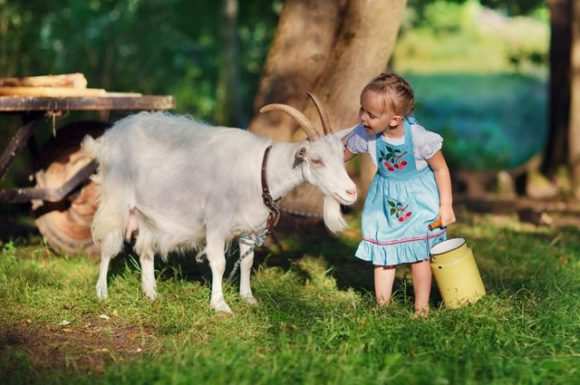
It should be noted that in the form of such porridge, milk loses most of its beneficial properties. Despite this, cereals are more easily accepted by the baby’s digestive system. Porridges adapted for baby food contain goat's milk with reduced fat content. The enzyme lipase is also added to the porridge, which makes it easier for the child’s body to break down fats. Also, to produce porridge, excess phosphorus can be removed from milk, which facilitates the work of the kidneys. A separate advantage of this porridge is the ability to give it to children from the first months of life.
If you can’t find a formula for your baby, and he spits up some, you can use goat’s milk from the first months of life. But do not forget that whole milk cannot be given to the baby during the first feeding - it must be diluted beforehand. No matter how many months a baby begins to eat goat’s milk, it is necessary to regularly observe and consult a doctor.
At such an early age, it is important to choose and prepare the right milk for feeding your baby.
What are the benefits of goat milk for children?
- Unlike cow's milk, goat's milk is less likely to cause allergic reactions.
- Potassium, magnesium, folic acid, vitamin A and vitamin B6 are included in its composition.
- Calcium from goat's milk not only satisfies the need of a growing body, but is also almost completely absorbed. And this is the prevention of rickets.
- Due to the insignificant amount of lactose in this product, it is permissible to administer it to infants with lactose intolerance.
- Taurine, contained in both human and goat milk, helps substances that form the immune system enter the body.
- The milk balls in the product are easily digestible. This means that the baby will spit up less.
- The quality of fatty acids contained in goat's milk is most preferable for the body of a child under one year old.
Tips for choosing
- Contact people you know who keep goats. Assess the conditions in which the animal is kept. You also need to monitor the milking process. If the goat is healthy, kept clean and milked hygienically, this milk can be used to feed the baby.
- If goat milk is bought at the market, you can request a veterinary certificate about the health of the animal. Without such a certificate, trading in market conditions cannot be carried out. The document must be provided upon the buyer's request.
- When buying milk in a store, you need to check the shelf life so that your baby eats only fresh product.
Preparation rules
Before preparing the drink, you need to personally verify the freshness of the product by tasting it. When tasting, no foreign tastes should be felt, especially bitterness. After taking a sip, you can wait a few minutes to feel the aftertaste, because even the slightest unpleasant aftertaste can cause the child to vomit.
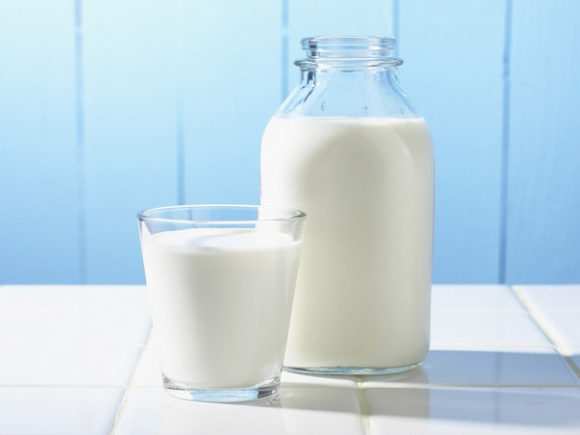
When first used, milk must be diluted with boiled water in a ratio of 1:3. If you neglect this advice, your baby may suffer from constipation caused by excessively fatty foods. Milk must be heat treated by boiling. It is not recommended to boil in metal containers - ceramic or glass dishes are suitable for these purposes. For storage, you should give preference to containers made of glass, ceramics or enamel.
After the baby gets used to this diet, you can dilute the milk in a 1:2 ratio. From what month is it legal to give pure milk? After a month of drinking diluted milk, undiluted milk will do.
You need to start giving the undiluted product with half a teaspoon, constantly monitoring the well-being and external condition of the baby. If no reactions were noticed, you can gradually increase the volumes.
If your baby develops a severe allergy or feels worse, you should stop using goat milk and consult a doctor.
Should a baby under one year old be given cow's milk?
Doctors recommend giving goat milk to babies from 9 months, and before that, feeding them with an adapted milk formula. Nowadays milk formulas made from goat's milk are produced. It’s a pity that they don’t have the beneficial properties of natural goat’s milk. If formula is not suitable for your baby and he often spits up, then you can use goat’s milk almost from birth.
Reading an article about mixtures (how to choose the right mixture)
If you nevertheless decide to feed your newborn goat's milk from the first days, then you must follow some rules.
- Try to take milk from friends and neighbors.
- Look at how the goat is kept, don’t be too lazy to come for milking.
- If you buy at the market, ask for a certificate from a veterinarian (is the goat healthy).
- When buying milk in a store, carefully study the production date and expiration date. Children should not use products with an expiration date.
- Try the milk yourself to see if there is any unpleasant aftertaste.
- It is necessary to dilute goat milk with boiled water for the first time. For a newborn, take 3 parts water to one part milk. If you don’t do this, your baby may get sick from being too fat.
- The milk itself must be boiled. It is not recommended to use metal containers for boiling.
- It is advisable to store milk in glass, enamel or ceramic containers.
- When the baby gets used to it, you can dilute it in a 1:2 ratio, after a month you can already give undiluted milk.
As you can see, the benefits of goat milk far outweigh its disadvantages. Of course, mother’s milk is optimal for an infant, but in the absence of it, goat’s milk may well be its replacement.
READ ALSO: Is it possible to give kefir to children under one year old? Recipes for making kefir for kids at home
Despite the fact that goat's milk is significantly superior to cow's milk in many of its qualities, it cannot become a complete replacement for breast milk. There are several reasons for this:
- Firstly, it does not contain all the nutrients a newborn needs, a small amount of which can result in the development of dangerous pathologies and affect the normal development of the baby. All this leads to characteristic diseases.
- Secondly, like cow milk, goat milk is casein (it contains 75% casein), which negatively affects the functioning of the child’s digestive system, unlike maternal milk, which contains a lot of albumin, which is quickly digested by the baby’s system. Albumin milk (which is most similar to women's milk) includes donkey and mare's milk.
- Thirdly, goat milk products contain too many vitamins and beneficial components that may simply not be absorbed by the baby’s unformed body.
Goat's milk, like cow's milk, should not be given to children under the age of one year. Mother's milk remains the optimal product for a newborn baby. An alternative in this case may be the consumption of special formulas based on children's dairy products.
For a growing child’s body, dairy food is a whole storehouse of useful substances, vitamins, calcium and other elements; it also contains a significant amount of healthy fats. That is why it must be included in feeding the baby and always have it as an additional food in the kitchen. It is very important to follow some age restrictions.
Each option has its positive and negative sides. Many people believe that goat milk is very healthy. But it also has its pros and cons.
Goat's milk has been considered a medicinal remedy since ancient times. But how similar is its composition to breast milk? It has more protein and fat. Pediatricians emphasize the following disadvantages:
- Has a high percentage of fat content;
- Contains lipase enzyme, which breaks down fats;
- Rich in phosphorus, which creates increased work of the child’s kidneys;
- There is no folic acid, which prevents the development of anemia.
If you have to choose between cow and goat milk, then pediatricians recommend goat milk. Pros of goat milk:
- Has less casein than cow's milk. Due to this, it is digested and absorbed much better;
- Contains a lot of calcium. This strengthens bone tissue, and these babies’ teeth erupt earlier;
- It turns into curdled clots in the baby's stomach, just like breast milk. It is prescribed to babies with frequent regurgitation;
- Considered hypoallergenic, recommended for children prone to allergies and diathesis.
Beneficial features
Drinking goat's milk reduces the risk of developing rickets and caries, participates in the formation of bone tissue, and strengthens it. Improves the functioning of the circulatory system, improves intestinal function, and has a good effect on the nervous system. Helps in the development of the brain, kidneys and liver.
In children under one year of age, the intestines are not fully formed. This causes problems with digestion of food. Since goat milk contains a lot of casein and a high percentage of fat, this can cause constipation. White lumps will be visible in the stool - undigested milk residues.
Goat milk contains small amounts of folic acid and iron. Due to this, a deficiency of these elements may occur and anemia may develop.
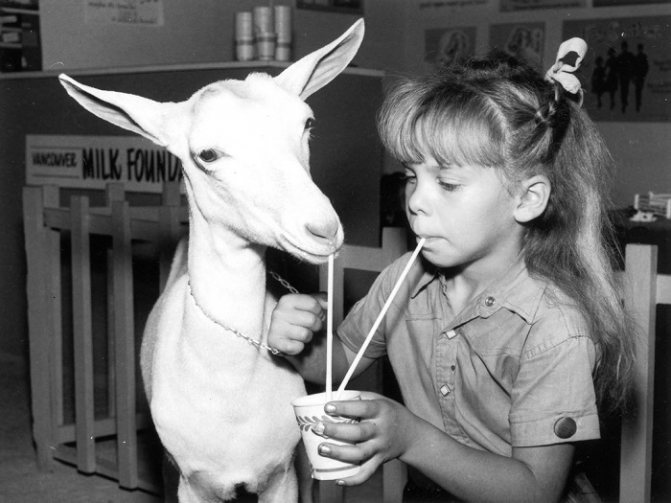
It is definitely worth subjecting goat's milk to heat treatment, especially if it was purchased from strangers. Through it, parasites and microorganisms that cause brucellosis can enter the child’s body. Milk will lose some of its beneficial microelements, but will become safe to consume.
From the moment of birth, adapted milk formulas based on goat's milk are prescribed. If the formula is not suitable for the child, stool retention and regurgitation occur, then goat milk can be given from birth. Before introducing a new product into your baby’s diet, you should discuss this with your local pediatrician. From the 9th month they begin to introduce pure foods into complementary foods. If the reaction to the new product is not adequate, then milk is stopped. They try again after a couple of months.
Until now, scientists are conducting various studies, trying to give a clearer answer to the question of when a child can be given milk. To understand when you can give cow's milk to a child, as well as when you can give goat's milk to a child, you need to clearly know about its effects on the health of babies under one year old and older children.
We invite you to read: Causes and treatment of urinary tract infections in children
It contains a wide variety of microelements and macroelements. It contains calcium, sodium, phosphorus, chlorine, sodium, and the amount of these elements in it is approximately three times greater than in breast milk. And in this case, we are not talking about the benefits of cow's milk during breastfeeding. After all, an excess of the listed elements in the body is no less harmful than their deficiency.
In infancy, the child’s excretory function is not yet adjusted as necessary. And when too much protein and minerals enter the baby’s body, the load on the imperfect excretory system and on the body as a whole increases significantly.
In addition, due to the increased work of the kidneys, more fluid is removed from the small body than it should be. As a result, the child feels thirsty, cries, and the mother again gives him cow's milk, which further worsens his condition.
There is very little iron in the milk that a cow gives, and this type of iron is not absorbed by a child’s body. As a result, the lack of this element leads to the development of iron deficiency anemia. During the period of active development of the body, iron is very important for the production of red blood cells and hemoglobin.
The age at which a child can be given cow's milk is also determined from the point of view of the absence of the necessary enzymes in the baby's body. Such enzymes are absent until at least two years of age. This is why the baby often has diarrhea in such cases. By the way, sometimes a person lacks the enzyme necessary to digest milk throughout his life.
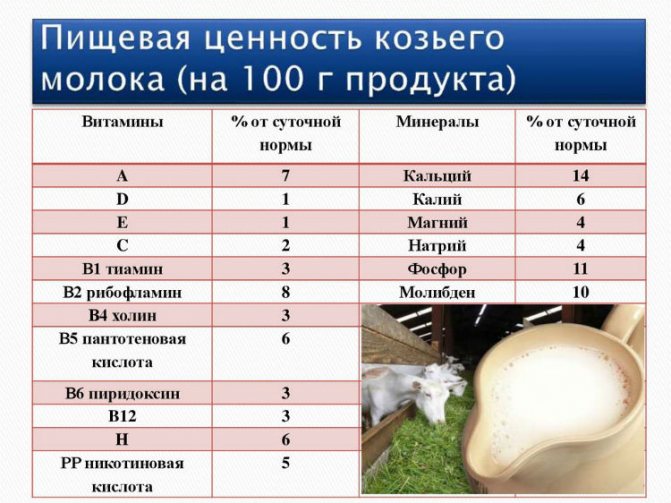
At the same time, during breastfeeding, the digestion process proceeds normally, since the baby’s body has the necessary enzymes for this. The baby's body easily absorbs the amino acids of mother's milk, while the amino acids of cow's milk are foreign to a small organism, and a very large load is required to break them down. Therefore, cow's milk is not so healthy for babies. At what age to give it, parents need to think carefully.
Casein is a protein from cow's milk. Its molecules are large, they damage the intestinal wall and mucosa. This leads not only to wall injuries, but also to the release of histamine into the blood, which provokes the development of allergic reactions. As a result, the baby may be diagnosed with hemocolitis. But bleeding due to damage to the delicate walls of the intestine, when occurring regularly, leads to a decrease in hemoglobin levels and the manifestation of iron deficiency anemia.
If your baby drinks cow's milk constantly, ulcers may form on the intestinal mucosa and, as a result, bleeding may occur. Therefore, the question of how many months this product can be given to children is not very correct, because it is better not to give it to a baby under one year old at all.
Many studies confirm that babies under one year of age develop allergies to this product quite often. Thus, according to the results of some studies, allergic manifestations to it in children under one year of age developed in a quarter of cases. Based on these results, nutritionists consider cow's milk one of the most allergenic foods.











